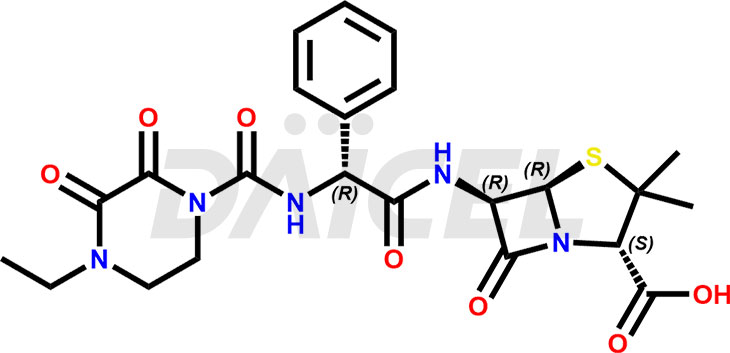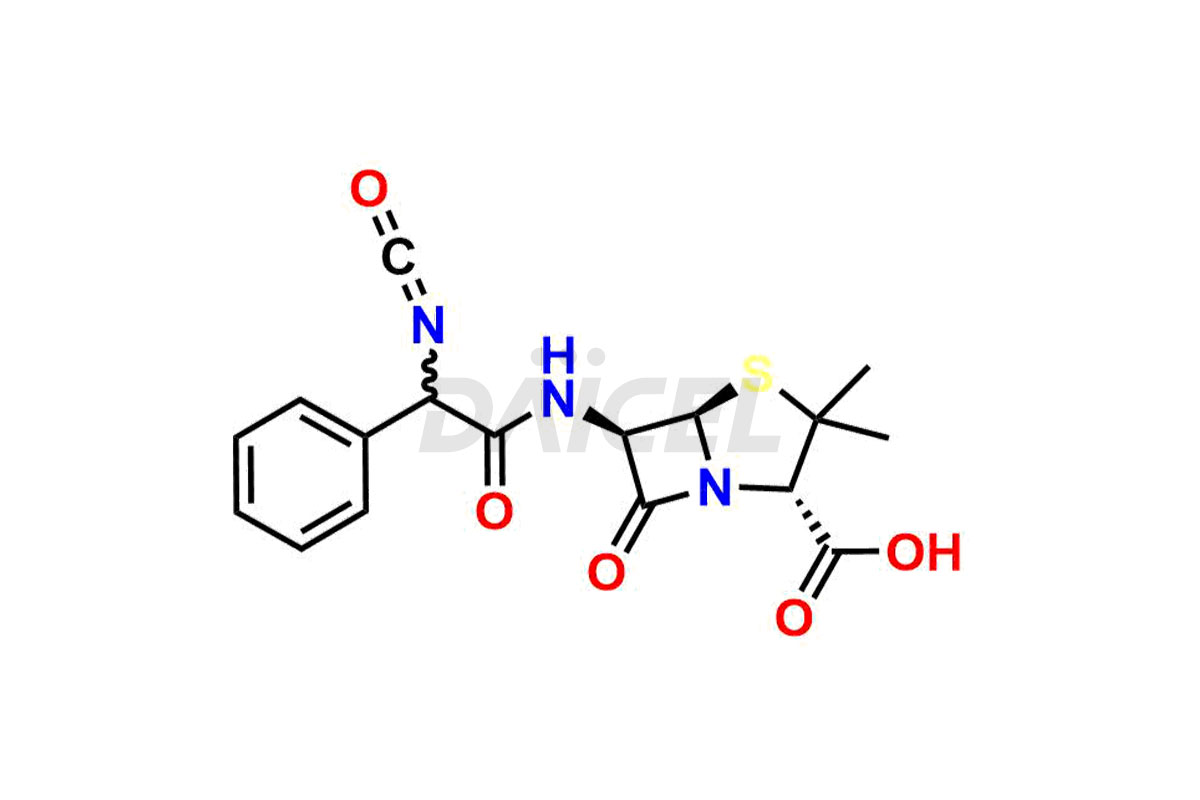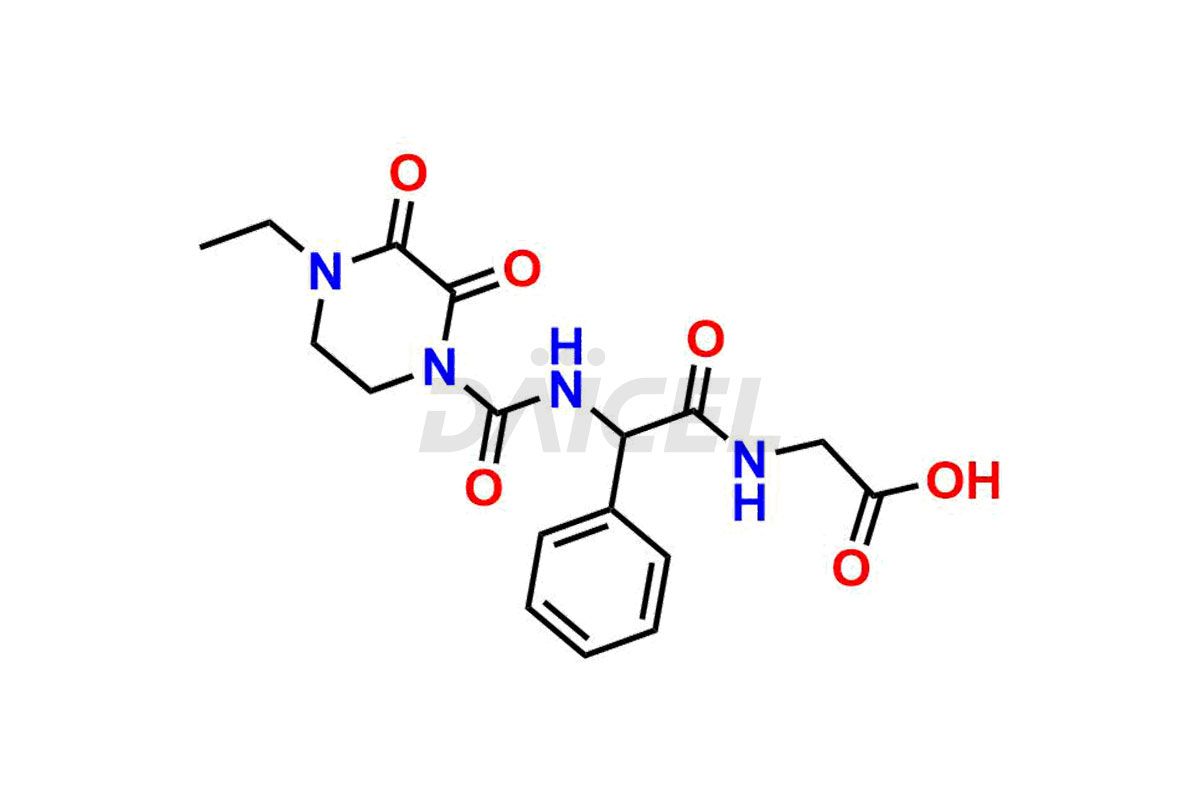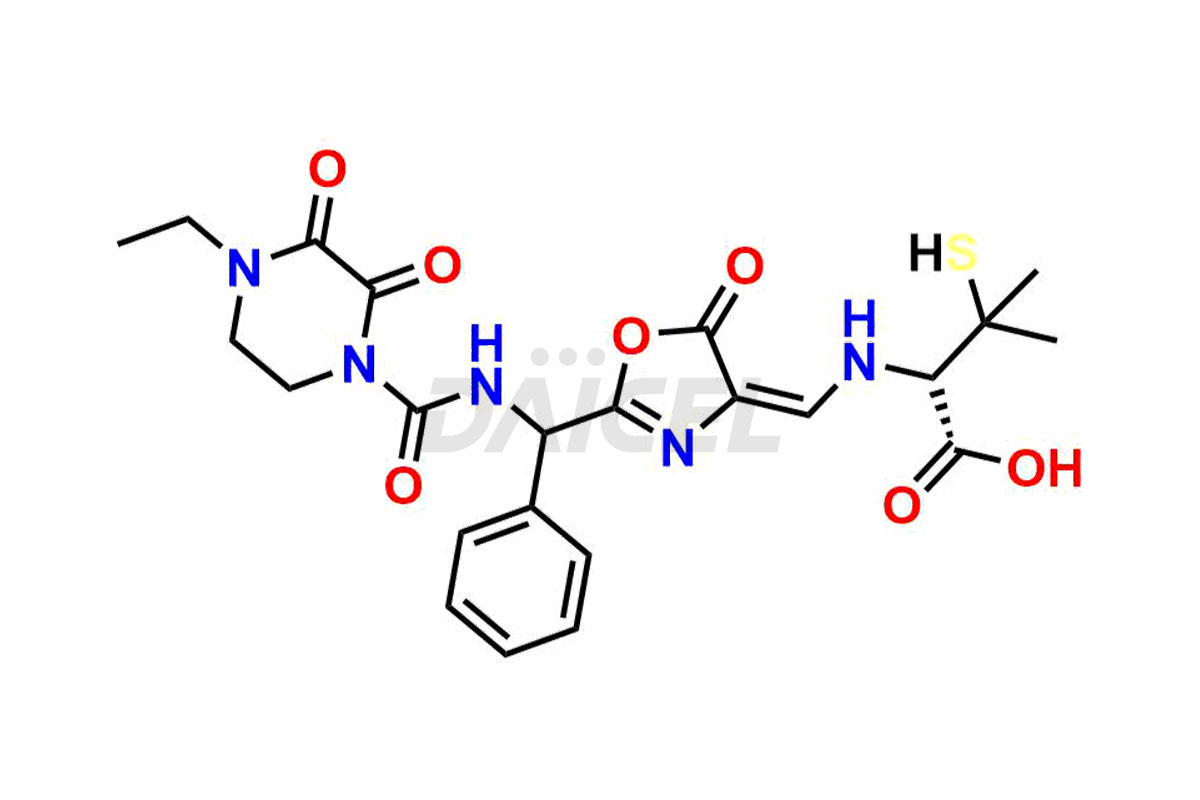Piperacillin
General Information
Piperacillin Impurities and Piperacillin
Daicel Pharma synthesizes high-quality Piperacillin impurities, (2S,5R,6R)-6-((S)-2,5-dioxo-4-phenylimidazolidin-1-yl)-3,3-dimethyl-7-oxo-4-thia-1-azabicyclo[3.2.0]heptane-2-carboxylic acid, Piperacillin EP Impurity-K, Piperacillin EP Impurity-J, and Piperacillin EP Impurity-A Isocyanate, which are crucial in the analysis of the quality, stability, and biological safety of the active pharmaceutical ingredient Piperacillin. Moreover, Daicel Pharma offers custom synthesis of Piperacillin impurities and delivers them globally.
Piperacillin [CAS: 61477-96-1] is a fourth-generation, broad-spectrum antibiotic of the ureidopenicillin class that acts against susceptible microorganisms. It treats moderate-to-severe infections caused by these microorganisms in the body, including the abdomen, respiratory organs, and urinary tract.
Piperacillin: Use and Commercial Availability
Piperacillin is a semi-synthetic penicillin derivative with a broad spectrum of activity against various gram-positive and gram-negative bacteria, including some anaerobic organisms. It is particularly effective against enterococci and P. aeruginosa. It is used alone or with other medications to treat lower respiratory, skin and skin structure, urinary tract, and intra-abdominal infections. Piperacillin and a beta-lactamase inhibitor called tazobactam treat penicillin-resistant organisms. Piperacillin is available under various brand names, including Pipracil and Zosyn.
Piperacillin Structure and Mechanism of Action 
The chemical name of Piperacillin is (2S,5R,6R)-6-[[(2R)-2-[[(4-Ethyl-2,3-dioxo-1-piperazinyl)carbonyl]amino]-2-phenylacetyl]amino]-3,3-dimethyl-7-oxo-4-thia-1-azabicyclo[3.2.0]heptane-2-carboxylic acid. Its chemical formula is C23H27N5O7S, and its molecular weight is approximately 517.6 g/mol.
Piperacillin exerts its bactericidal activity by inhibiting cell wall synthesis. It is effective against gram-positive and gram-negative bacteria, aerobic and anaerobic.
Piperacillin Impurities and Synthesis
Impurities form during the synthesis1, storage, or usage of Piperacillin. These impurities are due to hydrolysis, oxidation, or degradation of Piperacillin under certain conditions. It can affect the quality and safety of Piperacillin and may cause adverse effects on patients. Therefore, it is essential to monitor and control impurities in the manufacturing and usage of Piperacillin.
Daicel offers a Certificate of Analysis (CoA) from a cGMP-compliant analytical facility for Piperacillin impurity standards, (2S,5R,6R)-6-((S)-2,5-dioxo-4-phenylimidazolidin-1-yl)-3,3-dimethyl-7-oxo-4-thia-1-azabicyclo[3.2.0]heptane-2-carboxylic acid, Piperacillin EP Impurity-K, Piperacillin EP Impurity-J, and Piperacillin EP Impurity-A Isocyanate. The CoA includes complete characterization data, such as 1H NMR, 13C NMR, IR, MASS, and HPLC purity2,3. We also provide 13C-DEPT and CHN on request. We give a complete characterization report on delivery. Daicel has the technology and expertise to prepare any unknown Piperacillin impurity or degradation product.
References
FAQ's
References
- Saikawa, Isamu; Takano, Shuntaro; Yoshida, Chosaku; Takashima, Okuta; Momonoi, Kaishu; Kutani, Chiaki; Kodama, Yutaka, Process For Producing Novel Penicillins And Cephalosporins, Toyama Chemical Co., Ltd., Japan, GB1517098, August 2, 1976
- Brisson, A. M.; Fourtillan, J. B., High-performance liquid chromatographic determination of piperacillin in plasma, Antimicrobial Agents and Chemotherapy, Volume: 21, Issue: 4, Pages: 664-5, 1982
- Aravind, M. K.; Miceli, J. N.; Kauffman, R. E., Analysis of piperacillin using high-performance liquid chromatography, Journal of Chromatography, Biomedical Applications, Volume: 233, Pages: 423-6, 1982
Frequently Asked Questions
How are impurities detected in Piperacillin?
Piperacillin impurities are detected by using analytical methods such as HPLC and LC-MS.
How do impurities in Piperacillin affect its shelf life?
Impurities in Piperacillin can reduce its shelf life by accelerating its degradation. It can lead to decreased potency and increased toxicity of the drug.
Which solvent helps in the analysis of Piperacillin impurities?
Acetonitrile is the solvent used in analyzing many Piperacillin impurities.
What are the temperature conditions required to store Piperacillin impurities?
Piperacillin impurities are stored at a controlled room temperature between 2-8 ⁰C or as indicated on the Certificate of Analysis (CoA).
Note: Products protected by valid patents by a manufacturer are not offered for sale in countries having patent protection. The sale of such products constitutes a patent infringement, and its liability is at the buyer's risk.





